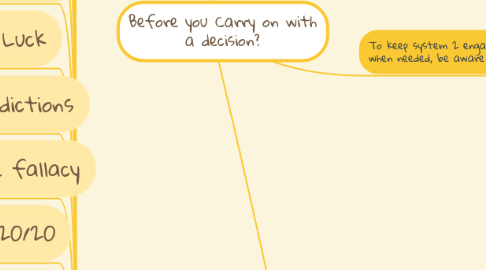
1. Which system is working now?
1.1. System 1
1.1.1. Automatic
1.1.2. Quick
1.1.3. Little or no effort
1.1.4. No sense of voluntary control
1.1.5. Intuition
1.1.6. Hungry ?
1.1.7. In a rush?
1.2. System 2
1.2.1. Effortful mental activity
1.2.2. Complex computation
1.2.3. Concentrating?
1.2.4. Deliberate
1.2.5. Rational
1.2.6. Slow down
1.2.7. Well fed? enough glucose?
2. Heuristics and biases
2.1. The law of small numbers
2.2. Confidence over doubt
2.3. Anchoring effect
2.4. Availability heuristic
2.5. Availability cascades
2.6. Representativeness
2.7. The conjunction fallacy
2.8. Overlooking Statistics
2.9. Overlooking Luck
2.10. Intuitive Predictions
2.11. The narrative fallacy
2.12. Hindsight 20/20
2.13. The issusion validity
2.14. Ignoring Algorithms
2.15. Trusting expert intuition
2.16. The planning falacy
2.17. The optimistic bias
2.18. Omitting Subjectivity
2.19. Theory induced blindness
2.20. Loss aversion
2.21. Endowment effect
2.22. The possibility effect
2.23. The certainty effect
2.24. The expectation principle
2.24.1. Gains/losses vs High prob/low prob
2.25. Overestimating the likelihood of rare events
2.26. Thinking narrowly
2.27. Disposition effect
2.28. The Sunk Cost Fallacy
2.29. Fear of regret
2.30. Ignoring joint evaluations
2.31. Ignoring Frames
2.32. Ignoring our two selves
2.32.1. Experiencing Self
2.32.2. Remembering Self
2.32.2.1. The Peak end rule
2.32.2.2. Duration neglect
2.33. Narrative wholeness
2.34. Valuing A remembering self over an experiencing self
2.35. Affective forecasting
2.36. The focusing illusion
2.37. MISWANTING
3. To keep system 2 engaged when needed, be aware of
3.1. THE ASSOCIATIVE MACHINE
3.1.1. PRIMING.
3.1.1.1. Things influence our judgment
3.2. Cognitive Ease/strain
3.2.1. How do you know that a statement is true?
3.3. Coherent stories (associative coherence
3.3.1. We posit intention and agency where none exists, we confuse causality with correlation, and we make more out of coincidences than is statistically warranted.
3.4. JUMPING TO CONCLUSIONS
3.4.1. Confirmation Bias
3.4.1.1. Are we searching for an evidence for a belief and overlooking counter examples?
3.4.2. Halo effect
3.4.2.1. tendency to like or dislike everything about a person—including things you have not observed,”
3.4.2.2. WYSIATI
3.5. Judgement (Mental shotgun)
3.5.1. Are we evaluating a decision without distinguishing which variables are most important? The “mental shotgun” approach
3.6. Are we going for an easier question?
3.6.1. Substitution
3.6.1.1. What is happiness? vs What is my mood right now? (Getting around to answering the harder question?)
3.6.2. Affect
3.6.2.1. People let their likes and dislikes determine their beliefs about the world
